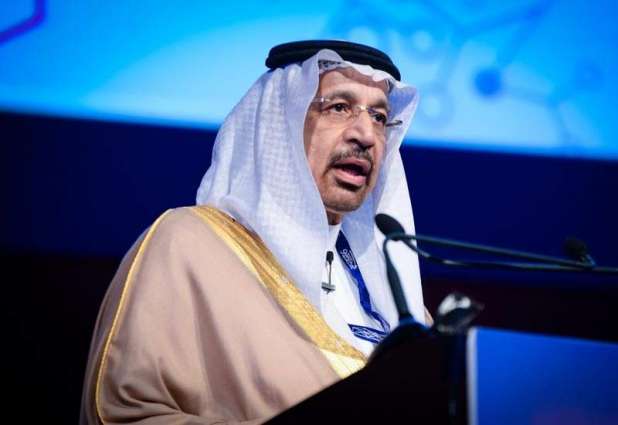Khalid al-Falih, Saudi Arabia's Minister of Energy, Industry, and Petroleum Resources has highlighted the Kingdom’s belief in an integrated and comprehensive approach to address energy sustainability, from the source to the end-user, thus transformational efforts were made to address both energy supply and demand
by Esraa Ismail ABU DHABI, (Pakistan Point News - 15th Jan, 2019) Khalid al-Falih, Saudi Arabia's Minister of Energy, Industry, and Petroleum Resources has highlighted the Kingdom’s belief in an integrated and comprehensive approach to address energy sustainability, from the source to the end-user, thus transformational efforts were made to address both energy supply and demand.
He explained, "To state the obvious, on the supply side, Saudi Arabia is rich in multiple sources of energy – from oil and gas to solar and wind, as well as abundant uranium resources – all energy sources that are destined to play an important role in the global energy mix in the coming decades.
"And when it comes to our own energy mix, we are optimising it dramatically by switching to cleaner fuels, improving the efficiency of our power sector, and introducing renewable and nuclear energy.
"Over the coming decade, liquids burning in our utilities will be virtually eliminated, while the share of gas capacity will grow from around 50 percent currently to nearly 70 percent, which will be the highest among the G20."
In a speech during the Abu Dhabi Sustainaiblity Week, al-Falih stated, "We are also making steady progress in improving the power system efficiency inclusive of generation, transmission and distribution, and will be restructuring our electricity industry and modernising its institutional framework to attract significant and sustainable private investment flows."
The Saudi Energy Minister went on to say, "Over the next decade we will create, in the Kingdom, a global hub of renewable energy capability upward of 200 GW, spanning the entire value chain from local manufacturing to project development, domestically and abroad. In fact, in the next 10 years, we will develop domestically close to 60GW of renewable energy capacity, of which 40GW will be photovoltaic solar power, 3GW will be concentrated solar power, and 16 GW of wind."
To achieve this, al-Falih continued, the Ministry of Energy, Industry and Mineral Resources, and the Public Investment Fund, PIF, will be working together to deploy two parallel and complementary tracks. "The PIF and its selected partners will develop 70 percent of the total renewable energy capacity with the objective of accelerating the localisation of our manufacturing capability, while the Ministry will continue to drive breakthrough prices for the Kingdom by competitively tendering the remaining 30 percent."
He also congratulated Masdar, who – along with their consortium partners EDF New Energy – were last week awarded Saudi Arabia’s first utility-scale 400 MW onshore wind farm, saying, "In doing so, Masdar set a new record in the cost competitiveness of wind power generation. This adds a second global benchmark from Saudi Arabia’s renewables programme which last year also saw a new record set in the field of photovoltaic power generation with our 300 MW solar park in Sakaka, won by Acwa Power."
Speaking about the deployment of renewable energy projects in Saudi Arabia, al-Falih said that in 2019, no less than 12 projects will be tendered to stimulate investor, manufacturing and developer activity across the entire value chain. "This will be coupled with the citizens’ uptake of rooftop solar in addition to various other giga-scale projects on the horizon," he added.
In addition, Saudi Arabia will begin to introduce nuclear power into the mix, initially with two reactors in the next decade, with a combined production of 2 - 3.2 GW. "All of this means that as we switch to a more judicious use of our abundant, cleaner, cost-competitive, and sustainable resources, we will significantly reduce our greenhouse gas intensity," al-Falih explained.
He added, "On the demand side, our energy productivity will improve significantly. We have established a comprehensive energy efficiency programme, initiated energy price reforms, and launched carbon management initiatives to drive sustainability.
"Energy price reforms are also aiding in achieving our energy efficiency goals. Since reforms were put in place, we have noticed a growing public interest in energy efficiency, and a clear change in behaviour."
"Last year alone, and for the first time, gasoline demand dropped by eight percent compared to 2017, while electricity demand saw a decline," the Saudi Minister enthused, adding that energy efficiency efforts combined with energy price reforms are expected to reduce the Kingdom's local energy consumption by 1.5 to 2 million barrels of oil equivalent per day by 2030 compared to a business-as-usual scenario.
In addition to these national efforts, the Kingdom is putting its resources behind developing new technology solutions for the world. "We are investing in new energy and efficiency technologies, and encouraging international to find both technological and policy solutions to the challenges of climate change," al-Falih concluded.




